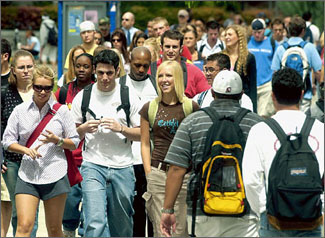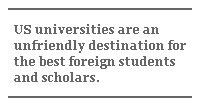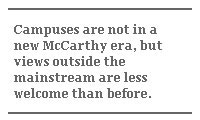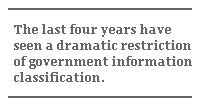Fallout from the War on Terror – Part I
Fallout from the War on Terror – Part I

IOWA CITY: Washington's war on terror may be quietly taking a toll on unsuspecting quarters – its universities. To understand the effects of anti-terror policies on the US academic sector, it helps to spend time on university campuses in Australia, Singapore, the United Kingdom, or other countries. From Melbourne to Edinburgh, those institutions are now filled with foreign students, many of whom would have come to the US, had they not been deterred by restrictive visa policies.
The inconsistent and ham-fisted implementation of a valid goal – preventing terrorists from entering the United States – has hindered or severely delayed many innocents from realizing their dreams of education, research, or teaching in the United States. Thousands who are not terrorists have been denied visas, and many more have been forced to wait – often for months or years – preventing them from continuing their legitimate academic work. Even as policies have eased in the last year or two, the perception remains: US universities are an unfriendly destination for the best foreign students and scholars. And so the United States is increasingly losing a global competition for the finest thinkers and innovators, regardless of their countries of origin.

In the immediate aftermath of Sept. 11, doors to US education and research clearly closed – at a time when Australia, Britain, France, Singapore, Japan, and others were aggressively campaigning to attract the best and the brightest from abroad. Higher education is the fifth-largest US export in the services sector, and it accrues at least US$12 billion to the United States each year in spending by foreign students and scholars. US academic institutions hosted over half a million international students and scholars in 2002. These students and scholars bring innovative ideas and a spirit of hard work; for decades, they have helped the United States produce exceptional scientific, social science, and other research, helped train American students, and provided an invaluable window into other cultures.
One of the problems with US anti-terrorism policy lies with the Student and Exchange Visitor Information System (SEVIS), a database that has frustrated colleges and universities from its inception, though the situation has improved somewhat. Its operations include extensive checks on thousands of visa applicants, including many who returned home only briefly. SEVIS and other programs, which impose longer waiting times and stringent investigations, have significantly affected laboratories, science departments, and even the occasional English department.

Anti-terrorism policy has also led to an increase in government secrecy. A reversal of declassification efforts underway since the 1960s has made it more difficult for the research community to obtain data and release research results. The last four years have seen a dramatic restriction of two areas of government information classification, which were openly available in the past. One such area is information that government departments may not, by law, classify as confidential or secret. To sidestep this technicality, the government created a new category, "sensitive but unclassified information," and refused to release data under that label. The second category, "sensitive homeland security information," also permits the government to restrict access to information on government programs and activities that cannot be classified. Both policies have been sharply opposed by prominent academic organizations such as the National Academy of Sciences, the National Academy of Engineering, and the Institute of Medicine, as well as by journalists and others concerned with the free flow of information.
Anti-terror policy has also led to direct interventions on campuses and the occasional silencing of debate. At Drake University in Iowa, federal authorities issued – and were later forced to rescind – a broad subpoena seeking information on student protestors against the war in Iraq. At the University of Texas in Austin, military intelligence agents walked the corridors of the law school, seeking information on "suspicious" attendees at a conference on Islam, law, and gender. Most seriously, some academics have been caught up in the web of anti-terror policy. The most well-known such case is the prominent Texas Tech University infectious disease researcher Thomas Butler, sentenced to two years in prison after he voluntarily reported that two vials of plague were missing from his laboratory. In a prominent scientific journal, 14 of his colleagues lamented "the plight of our esteemed colleague, whose career and family have, as a result of his efforts to protect us from infection by this organism, paid a price from which they will never recover."

Post-9/11 policies have also affected university funding and grant distribution – a fact virtually unknown outside the quiet offices of university presidents and academic vice presidents. As the US government has sought to prevent charities from being used as conduits for terrorist financing – an important goal – it has pressured foundations and other American nonprofits to guarantee, under penalty of law, that no philanthropic money go to ill-defined lists of terrorists and organizations. In November 2002, the US Treasury Department took steps to limit overseas funding by public charities, asking nonprofits to comply with a substantially widened and detailed set of new provisions.
Forced onto the defensive, their grants scrutinized by the government, several important US philanthropic institutions have quietly responded. Some major foundations, such as the Ford Foundation and the Rockefeller Foundation, have shifted part of this risk to their grantees, requiring them to sign tough new letters taking full responsibility for broad definitions of violence or terrorism conducted with grant dollars. A number of academic institutions have protested against this move. In April 2004, the provosts of Chicago, Harvard, MIT, Princeton, Stanford, Yale, and three other universities wrote to the Ford and Rockefeller foundations, calling the new grant language vague and warning that it might impinge on political speech. "Whatever university administrators may think of the merits of the political views expressed," they wrote, "these fall under the protection of freedom of academic speech." At least two universities explicitly declined to sign the letters, jeopardizing an important source of research funds during tough budgetary times. The dispute with Ford was resolved in late 2004 and early 2005, but the episode illustrates the strong pressure to which both philanthropic and academic institutions have been subjected.

The key issues here are twofold. First, restrictive US visa and security policies continue to discourage and prevent many exceptionally talented students and scholars from even attempting to pursue their studies and careers in the United States – a situation compounded by the exceptional entrepreneurship of other nations and universities in seeking out, welcoming, and funding that brainpower. The long-term effects on US competitiveness cannot now be measured, of course, but in the decades before Sept.11, these foreign students and scholars had long been key contributors to a creative, research-based, value-added economy in the United States.
Second, the silencing effects of post-9/11 anti-terror policies continue to resonate on US university campuses. The Butler case is one example; there are others, catalogued most notably by the Association of American University Professors (AAUP), of the chilling of controversial speech in the wake of the terrorist attacks. Campuses are not in a new McCarthy era, but views outside the mainstream are less welcome than before – a development contributing little to the war on terrorism.
Even though some policies have begun to ease in recent years, the academic community still feels the heat of antiterrorism policy. Only with continued pressure by the academic and scientific community, federal legislators, civil liberties organizations, and others can these problems gradually be ameliorated. The damage will take years to overcome.
Mark Sidel is professor of law at the University of Iowa and earlier served with the Ford Foundation in Beijing, Hanoi, Bangkok and New Delhi. This article is adapted from his book, More Secure, Less Free? Antiterrorism Policy and Civil Liberties After September 11 (University of Michigan Press, 2004).